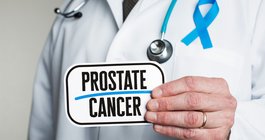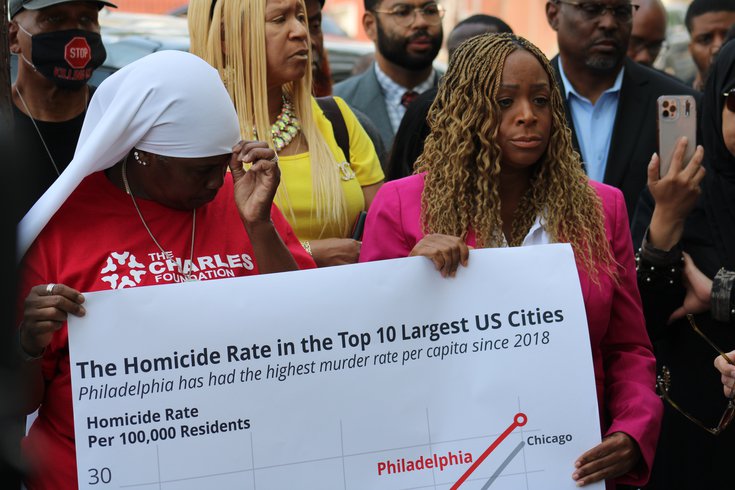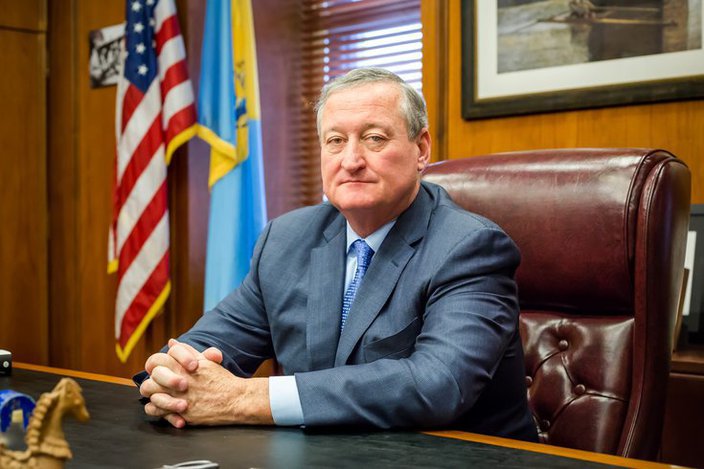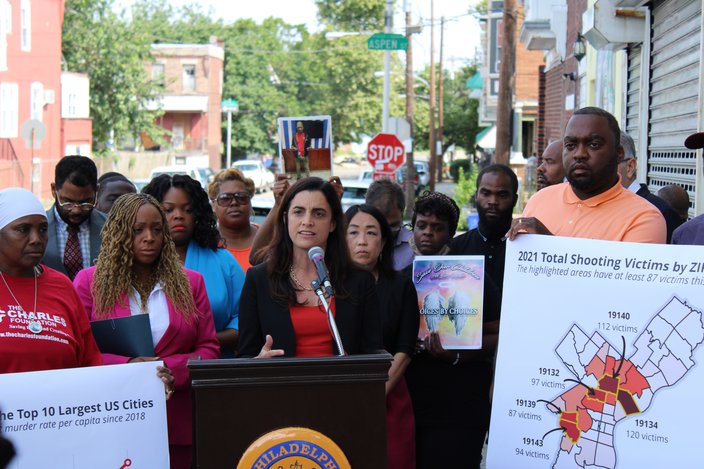
July 22, 2021
 Brooks Holton/PhillyVoice
Brooks Holton/PhillyVoice
Councilmember Jamie Gauthier, right, presented Mayor Jim Kenney with a list of action steps to address gun violence in Philadelphia on Thursday, July 22, 2021. The plan comes just days after the mayor told Gauthier he will not declare a state of emergency over gun violence.
Councilmember Jamie Gauthier stood on the corner of North 51st Street and Haverford Avenue, not far from where a 1-year-old boy was shot inside a grocery store less than a week ago, and rattled off a list of Philadelphia's latest gun violence victims.
With more than 1,300 people shot and the city nearing 320 homicides less than seven full months into 2021, the West Philly representative said she was done debating Mayor Jim Kenney over whether the violence constitutes a state of emergency declaration.
"All this week, we've been hearing about how the mayor doesn't want to declare gun violence an emergency," said Gauthier, who last year authored a resolution calling on Kenney to do just that. "Fine. Fine. Call it whatever you want. All I care is that you do more."
Gauthier and City Controller Rebecca Rhynhart on Thursday sent the mayor a letter outlining eight action steps they want his administration to take to curb gun violence in the zip codes most plagued by shootings. The letter also demands Kenney provide an update on his Roadmap to Safer Communities anti-violence strategy and a timeline for the city to spend the $155 million allocated for violence prevention in this year's budget.
"Considering the tragic toll that this epidemic has taken on my district, and what the day-to-day reality has become for my constituents over the last year, in my eyes, there is no hope for equity in this city if we don't tackle our gun violence crisis head on," Gauthier said.
Kenney has remained skeptical that an emergency declaration would "demonstrably change conditions" in Philadelphia. During a bi-weekly gun violence briefing Wednesday, Kenney said "there is no greater priority" for his administration than stopping the shootings.
Philadelphia Mayor Jim Kenney has refused to declare a state of emergency over gun violence in the city. In a letter to Councilmember Jamie Gauthier, the mayor said such a declaration 'is not a solution that will demonstrably change conditions in Philadelphia.'
But Kenney has refused to make an emergency declaration. He said it would not unlock additional funds for violence prevention and that his administration "has been working to address violence in a coordinated fashion for several years."
"The reality is that the gun violence epidemic is impacting cities across the country, and Philadelphia is participating in every opportunity to learn and share with our peers," Kenney wrote in a letter to Gautier earlier this week.
That response was met with frustration from Gauthier, Rhynhart and many of the speakers at Thursday's news conference in West Philly.
"The Kennedy administration all but said they think they are doing all that they can. They think they're doing all that they can to stop this violence," Rhynhart said. "I cannot accept that. The people of our city cannot accept that."
City Controller Rebecca Rhynhart, middle, speaks during a news conference Thursday, July 22, 2021, in West Philadelphia. Rhynhart and Councilmember Jamie Gauthier drafted an action plan sent to Mayor Jim Kenney outlining steps to address gun violence.
"If everything is being done, then we wouldn't be seeing five people shot on average every day," Councilmember Kathy Gilmore Richardson added. "... The longer this crisis continues unchecked, the more harm we are inflicting on ourselves and our communities in the future."
In their letter, Gauthier and Rhynhart gave Kenney until July 30 to respond with a "detailed plan and timeline" for implementing each of their action steps.
In a statement to the Inquirer, Kenney spokesperson Deana Gamble said the mayor "looks forward to continuing to work with colleagues on City Council to continue to respond to this crisis."
"The Mayor is glad to hear the Councilmember is not focused on semantics, and that the recommendations she's presented are closely aligned to the work the administration is already undertaking to continue our response to the national public health emergency that gun violence presents," Gamble told the newspaper.
Gauthier said she has not sat down with Kenney to discuss gun violence in Philadelphia since last fall. When asked about Kenney reminding the public that he declared gun violence a public health crisis in 2018, Gauthier was dismissive.
"I think everyone can tell we're not doing enough," she said. "It's not enough to point to a plan that was developed several years ago and say, 'Look, this is our answer.' I think everyone standing here today can say that … what we're doing right now in this moment needs to be ramped up."